Washington, N.C. – ECU Health Beaufort Hospital, a campus of ECU Health Medical Center President Debra Hernandez, MHA, RN, FACHE, CENP, will assume the fulltime role as senior vice president, System Emergency Services effective Feb. 26.
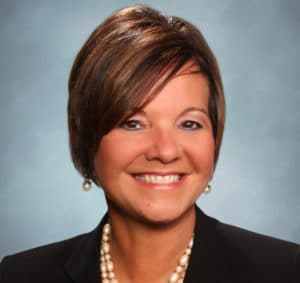
Debra Hernandez, MHA, RN, FACHE, CENP
Hernandez joined ECU Health in 2018 as the president of ECU Health Duplin Hospital. In 2020, she transitioned into a dual role as president of ECU Health Beaufort Hospital as well as system vice president of Emergency Services.
Hernandez’s transition into this role goes hand-in-hand with ECU Health’s investment in transforming its care delivery system with the goal of ensuring patients receive care at the right place and time across the region. Emergency Services are a critical component of health care delivery and impact capacity, access and clinical operations, particularly at a time when patient volumes in emergency departments are high. Hernandez, alongside physician leadership, will be responsible for clinical and operational excellence for system Emergency Services.
“I want to thank Debra for leading a transformational period at ECU Health Beaufort Hospital and for her willingness to tackle this new challenge,” said Brian Floyd, chief operating officer, ECU Health. “Debra’s expertise and experience in overseeing Emergency Services are particularly valuable in today’s health care environment where we are seeing increasingly high demands in emergency departments across the nation, state and here locally. I have full confidence in Debra’s ability to optimize our system-wide Emergency Services and improve clinical efficiencies for patients and team members.”
With Hernandez’s transition into her new role, Dennis Campbell, II DHA, BSN, RN, NEA-BC, CPHQ, will serve as interim president at ECU Health Beaufort. Campbell has been with the health system and in his current role as ECU Health Beaufort’s vice president of Patient Care Services for more than two years.
Children and adolescents with mental health care needs will benefit from a $3.2 million partnership between East Carolina University and the United Health Foundation.
The grant will expand the North Carolina Statewide Telepsychiatry Program (NC-STeP) within the ECU Center for Telepsychiatry and e-Behavioral Health. The investment is part of the United Health Foundation’s ongoing commitment to working with ECU to address mental health challenges in North Carolina — this time with youth.
In joining leaders to announce the three-year partnership, North Carolina Gov. Roy Cooper highlighted the critical needs surrounding children’s mental health in the state.

“Not only do we need to pay attention to our health, but our mental health as well and we’re recognizing that more than ever,” Cooper said. “That’s why I am so excited that the United Health Foundation, Dr. Sy Saeed and ECU have come together to try to get mental health treatment to young people in a more efficient and better way.”
Cooper said the NC-STeP partnership between ECU and the United Health Foundation helps advance toward his mission for the state for people to be able to live healthier lives with opportunities of purpose and abundance. Cooper said residents of rural North Carolina know how hard it is to get access to health care. Telemedicine will help bring experts to people wherever they are throughout North Carolina.
“I’m excited about this project. There are going to be people’s lives improved and people’s lives saved because of it,” Cooper said.
Through this expanded program, NC-STeP will provide access to mental health services for children in their established pediatric or primary care setting, removing the stigma sometimes associated with mental health care, said Saeed, director of the ECU Center for Telepsychiatry and founding executive director of NC-STeP. Through telemedicine, the program will offer expert consultation support for clinicians.
“In North Carolina, children experience significant challenges accessing the care needed to address their mental health. More than 70% of children in North Carolina with a mental health disorder do not receive treatment, and 92 out of 100 counties in the state are designated as mental health professional shortage areas,” Saeed said. “A growing body of literature suggests that the use of telepsychiatry to provide mental health care has the potential to mitigate the workforce shortage that directly affects access to care, especially in remote and underserved areas.”
NC-STeP was established in 2013 and has completed more than 56,000 psychiatry assessments in hospital emergency departments and has served more than 14,000 patients in its 23-community primary care settings. The expansion will provide mental health care services to underserved children and adolescents in six community-based pediatric and primary care clinics in rural and underserved parts of the state.
U.S. Reps. Greg Murphy and Don Davis, who helped guide NC-SteP in the General Assembly, have continued to support the initiative in Congress.
“It’s the people with boots on the ground, the people who are actually taking care of patients who deserve most of the praise,” Murphy said. “Sy has been a lifesaver for many individuals.”
Murphy thanked United Health Foundation for funding the initiative that will help address the unique challenges of patients in rural areas.
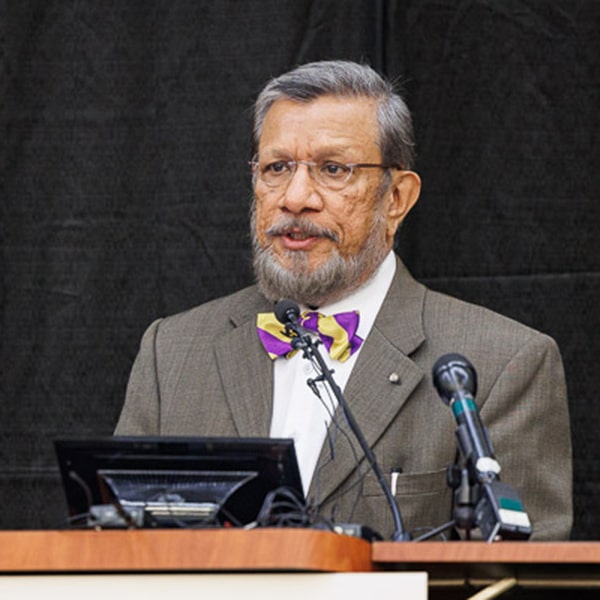
Davis emphasized the focus on children’s mental health as an important step in the effort to “provide every child a fighting chance to realize the American dream in eastern North Carolina. Dr. Sy has been a fearless voice in this effort,” Davis said.
“We’re honored and excited to partner with East Carolina University to address key health challenges our young people are facing,” said Anita Bachmann, CEO, UnitedHealthcare Community Plan of North Carolina, part of UnitedHealth Group. “By working together and creating an interconnected system of clinical and social services, we can continue to produce better health outcomes for North Carolinians.”
The United Health Foundation and ECU also partnered in 2020 through a $1.25 million grant to expand telepsychiatry services to address the mental health needs of expectant and new mothers. Through the Maternal Outreach Using Telehealth for Rural Sites (MOTHeRs) project, ECU developed and deployed a new obstetric care model for high-risk patients and addressed food insecurity among pregnant women.
North Carolina Health and Human Services Secretary Kody Kinsley touted the importance of access to health care — particularly mental health care services — in rural North Carolina.
“There is no health without mental health,” Kinsley said. “In particular, I think we know that mental health needs for children are more acute than ever.”
Kinsley said the investment announced today is a “win-win-win.” The project is being built on a program that has led statewide in expanded access to care.
“Truly it has been ECU driving access to telepsychiatry far before it was a fashionable thing,” Kinsley said.
Innovation is at the center of ECU’s initiatives fostering regional transformation in health care. ECU Chancellor Philip Rogers said the partnership with the university and the United Health Foundation allows many disciplines across campus to address the disparities in health care.
Rogers said the initiative would not be possible without the steadfast dedication and hard work of leaders at ECU, beginning with Saeed, who leads the team responsible for the operational aspects of the program.
“This transformative grant builds on our leadership in leveraging technology to provide care in the region and across the state,” Rogers said. “Our partnership with the United Health Foundation runs quite deep. This partnership has already made a significant impact as we prepare students to address the critical shortage of mental health professionals in our state.”
“Lucky” Xue, Robert D. Teer Distinguished Professor, Department of Management Information Systems, and students in the ECU College of Business are responsible for two components of the project — a virtual reality video game (AI) and a knowledge management system (KM). Xue said the project would have a profound impact on her research, teaching and community engagement.
“The objective of the AI-KM component is to strengthen the collaboration among mental health care professionals, family members and community partners across eastern North Carolina, and to optimize the utilization of existing mental health knowledge while uncovering innovative practices,” Xue said.
“The students from the Department of Management Information Systems in the College of Business will be given the unique opportunity to participate in the system development process. This will serve as a practical application of the knowledge they have gained through their coursework and an opportunity to make a positive impact on society. It’s an excellent chance for them to hone their skills and contribute to a meaningful cause.”
Regional disparities
In North Carolina, children experience significant challenges accessing the care needed to address their mental health. This partnership will help connect youth with mental health services in areas with provider shortages, said Dave Tayloe Jr. at Goldsboro Pediatrics.
“We have a significant shortage of mental health professionals, and often these key members of our health care workforce are not paid enough to cover their expenses when they provide mental health services for at-risk children. Most communities do not have even one child psychiatrist to help primary care providers care for the children who have the most serious mental health problems,” Tayloe said. “We have seen great benefit from providing mental health educational courses for primary care health professionals, having mental health professionals who work in the schools, the primary care practice, and the community, and having access to telepsychiatry services for the children most at risk for adverse mental health outcomes.”
The new grant program will take about six months to prepare. Saeed said that through NC-STeP, ECU is serving others as the university’s mission calls it to do.
“Mental health — including psychological, emotional and social well-being — is a vital part of our overall health. This is especially true for children when we consider that for many adults with mental disorders, symptoms were present, but often not recognized or addressed, in childhood or adolescence,” he said. “The good news is that we live in times when the care for mental disorders has never been more effective.”
Read more from ECU News Services.
Student perseverance and community and industry partnerships were highlighted in special presentations at the East Carolina University Board of Trustees’ February meeting.
The board also welcomed Brandon Frye, vice chancellor for student affairs, who officially joined ECU this week.
On Thursday, four students spoke during the University Affairs Committee meeting about their struggles and how ECU programs helped them continue to move forward. The students and the programs are: George Cherry Jr., Students’ Treasure Chest; Nellyana Cordero-Cisnero, Pirate Promise; Adam Harrison, Pirate Academic Success Center; and Iyaira Williams, Purple Pantry. Chris Stansbury, associate vice chancellor and senior operating officer for student affairs, moderated the panel.
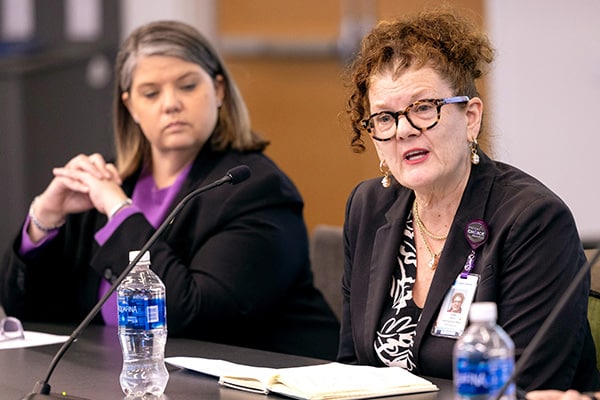
In introducing the students, Provost Robin Coger said earning a degree requires students to persevere even when faced with challenges. ECU provides a range of support for student success. “Ultimately they come out of ECU ready for successful careers, but there are a lot of steps in between,” she said.
Cherry, who is earning three degrees and plans to attend medical school, put 24,000 miles on his car driving to class last year from his Bertie County home, where he helps take care of his younger sister. He was able to get help from the Students’ Treasure Chest when his car needed repairs. He is working to give back to the university through service and his involvement in different organizations, including the Student Government Association.
Cordero-Cisnero is a first-generation student from Raleigh who attended community college before transferring to ECU for a degree in elementary education. She said an ECU alum introduced her to Pirate Promise, which gave her a path to a four-year degree. “It opened a new door for me,” she said.
Harrison said he commuted from his home in Williamston his first year, and the connections he made at the Pirate Academic Success Center helped him become a stronger student. He now is a mentor to other students at the center.
Williams, from Raleigh, has volunteered at the Purple Pantry since her freshman year. As an ambassador, she helped the organization win a collegiate hunger challenge and $10,000, and she continues to work with the pantry to combat food insecurity. A recent partnership with the SGA has yielded almost 90 meals donated from unused meal swipes. The SGA also provided funding to purchase a freezer for the pantry to provide frozen meals.
The panel encouraged trustees to continue hearing from students and provide opportunities for conversation. They also suggested continuing to bring awareness to the resources that ECU offers.
In another committee Thursday, the trustee’s Committee on Strategy and Innovation heard an industry workforce panel discuss how partnerships can lead to innovation and economic prosperity in eastern North Carolina and beyond. Participants included representatives from ECU Health, Fly Exclusive and MrBeast. Topics ranged from the importance of building and strengthening partnerships and pathways to identifying ECU student and graduate talent to recruit to their businesses.
Panelist Julie Oehlert, chief experience and brand officer at ECU Health, said both the university and the health system can benefit from working more closely to integrate student experiences into education in a wide variety of disciplines in health care and beyond.
“We share a community, we share learners that we both love deeply, in a variety of settings,” she said. “We share the responsibility of caring for eastern North Carolina; for educating eastern North Carolina and for advancing all the people that live in eastern North Carolina in their learning and in their health. That’s why we are ECU Health now; never before has the imperative for a strong partnership been more relevant or more necessary.”
The panelists and committee discussed ways to encourage partnerships based on innovation and thinking outside the box that will push students to create real-world solutions in situations that prepare them to enter the workforce with concrete foundational experience.
The committee also adopted a resolution on freedom of expression for faculty and students, which was unanimously approved by the full board on Friday. The resolution reaffirms the Board of Trustees’ commitment to academic freedom and freedom of expression in which faculty and students can “teach, learn, seek and speak the truth” in an environment where “academic freedom flourishes” and the campus community is given “the broadest possible latitude to speak, write, listen, challenge and learn except insofar as limitations to that freedom are necessary to the function of the university.”
Trustees also received an update on refreshing the university’s strategic plan. Committee co-chair Sharon Paynter presented a list of internal and external strengths, weaknesses, threats and opportunities that impact university initiatives and ways ECU leadership, faculty, staff and students continue to navigate them.
Read more from ECU News Services
Roanoke Rapids, N.C. – ECU Health North Hospital is bringing comprehensive care close to home with its newest service providing advanced diagnostics through a mobile PET/CT service that began Feb. 2, 2023. PET/CT scans help diagnose different conditions such as cancer, heart disease and brain disorders while improving patient comfort.
“ECU Health North is proud to invest in our patients and care teams by bringing advanced mobile PET/CT services closer to home for our patients,” said Jason Harrell, president, ECU Health North Hospital. “We serve a vast rural area where access to high-quality, specialized care may be many miles away. Innovative technology like the combined PET/CT scan will allow our team to more conveniently create personalized treatment plans for each patient.”
Providers are able to perform the combined scans simultaneously in the same machine, eliminating the need for separate visits while reducing the time needed for scans.

Without this advanced technology, providers traditionally must overlay images of a patient’s individual CT scan and PET scan, which is less efficient than the combined scans offered by this new technology. Combined PET/CT scans take both scans of the patient in the same position for a higher level of accuracy to detect the presence and spread of illness or disease.
“The combined PET/CT scan allows us to more quickly diagnose health issues such as tumors or heart conditions so that we may begin treatment as soon as possible,” said Dr. Sandeep Pandit, Hematology/Oncology, ECU Health North Hospital. “We know early intervention gives patients a higher chance of survival and recovery, and having the PET/CT service available locally will help us improve quality of life of our patients while they undergo diagnosis, treatment and recovery.”
The mobile PET/CT service is the first PET scan and CT scan service for the Roanoke Rapids area. The mobile service is in partnership with Alliance Imaging and will be on ECU Health North Hospital’s campus every other Thursday from 8-11 a.m. Patients who receive a referral from their provider can schedule an appointment by calling 252-535-8888.
Support, action and investment are needed in the East to solve what community members and experts alike are calling a mental health crisis across the region and state. That was the common theme at the Mental Health Town Hall in Greenville hosted by North Carolina Department of Health and Human Services (NCDHHS) Secretary Kody H. Kinsley and local legislators Feb. 9.
The bipartisan panel for the town hall featured Rep. Gloristine Brown, Sen. Jim Burgin, House Majority Leader John Bell, Rep. Dr. Tim Reeder and Sen. Kandie Smith, all of whom represent districts that fall within ECU Health’s 29-county service area. With more than 150 people in attendance, community members and representatives for local organizations shared their perspectives on mental health with the panel.
Kinsley said town halls are crucial to help him and other state officials understand the unique challenges in each area of the state.
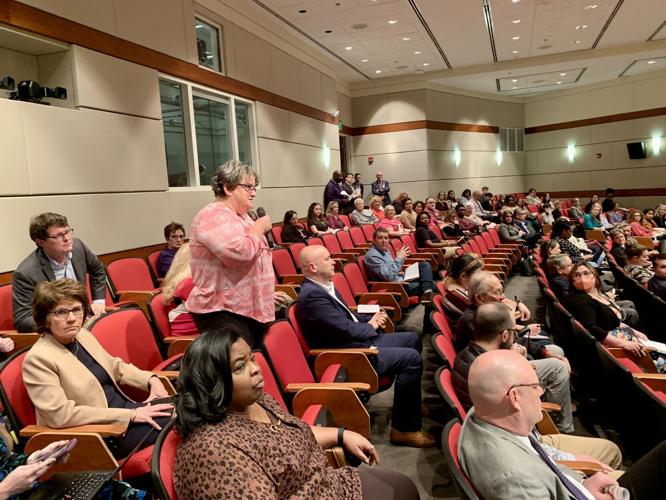
“We are having mental health challenges all across the state, but every community is different because every community’s resources are different and their needs are different,” Kinsley said. “It’s really important to me as we set statewide policy that we’re doing it in a way that is informed by boots on the ground, and we heard a lot of that tonight, and we know we have a lot of work to do, and I’ve appreciated this conversation.”
Dr. Michael Lang, chair of the Department of Psychiatry & Behavioral Health at ECU Health and the Brody School of Medicine said the town hall was a positive step to help share with leaders what he and others are seeing locally. He said it was symbolic to bring the event to Greenville where he and his team see a disproportionate number of patients daily needing mental health resources at the ECU Health Medical Center Emergency Department.
“This was a great event for us overall,” Dr. Lang said. “We had a chance to meet our leadership from Raleigh and let them know about the issues and challenges we’re facing, not only here in eastern North Carolina but across the state. I can tell you firsthand we feel the impact of the mental health crisis here in the region and here in Greenville at the medical center. The challenges we’re talking about, such as a lack of access to resources and a dependence on emergency department visits for those suffering from mental health crises, are felt every day at hospitals across the region. That’s why it is important to focus on improving outpatient behavioral health resources to crate stable environments and prevent hospitalization.”
Officials noted there are at least 350 mental health patients in emergency departments across the state waiting for bed placement on any given day. The lack of access to care and resources are more magnified in rural areas such as eastern North Carolina where there is a disproportionate number of under or uninsured individuals. The bipartisan panel all agreed Medicaid expansion in North Carolina would help provide necessary resources towards solving the crisis and Sen. Burgin noted that Medicaid expansion would allow the state to spend more than $1 billion on improving access to behavioral health resources.
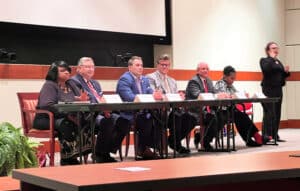 “ECU Health is grateful for our local legislators who are committed to having these difficult but necessary conversations while at the same time pursuing common-sense solutions like Medicaid expansion,” said Brian Floyd, chief operating officer, ECU Health. “Medicaid expansion would help provide needed health coverage to 100,000 people in our region and improve the way we as a state deliver behavioral health resources.”
“ECU Health is grateful for our local legislators who are committed to having these difficult but necessary conversations while at the same time pursuing common-sense solutions like Medicaid expansion,” said Brian Floyd, chief operating officer, ECU Health. “Medicaid expansion would help provide needed health coverage to 100,000 people in our region and improve the way we as a state deliver behavioral health resources.”
At ECU Health, the system announced a partnership with Acadia Healthcare to build a state-of-the-art, 144-bed behavioral health hospital in the medical district of Greenville, less than a mile from ECU Health Medical Center.
The hospital, slated to open in 2025, will provide important access to behavioral health services for adults and pediatric patients, with 24 inpatient beds specifically for children and adolescents with mental health needs.
“I’m incredibly grateful for health systems that have been investing in building more behavioral health beds,” Kinsley said. “This is important but I have a job to do on this, too. We have got to increase [reimbursement] rates to help make those beds sustainable and used.”
Resources
East Carolina University’s postgraduate program in cardiac psychology creates professionals who are ready to help patients cope as they adapt to life-saving heart devices.
On the heels of marking its 15th year, ECU’s nationally unique program in clinical health psychology continues to gain momentum through positive patient outcomes — and national recognition.
The program is a collaboration between ECU’s departments of psychology and cardiovascular sciences that has yielded a nationally unique blend of academics and research. The model integrates training psychology doctoral students and cardiology fellows in cardiac clinics, a strategy that the program’s founder calls the best of both worlds.
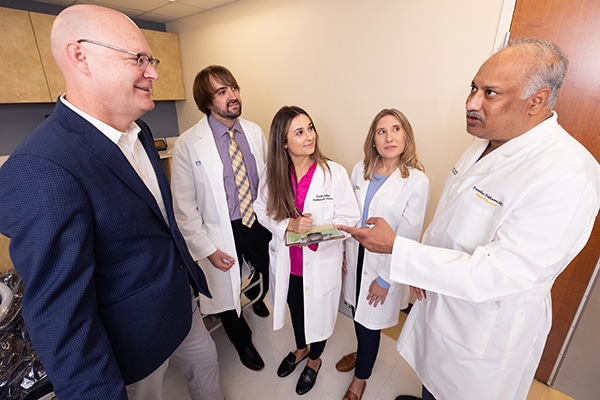
“This is a success story from eastern North Carolina,” said Samuel Sears, program director and professor in the departments of psychology and cardiovascular sciences. “From a national landscape, this is an extremely unique program. Only at East Carolina do you have this kind of synergized, integrated, one-for-one engagement in the training of cardiologists and the training of psychologists. Our program is intending to lead the country in this.”
Sears established the training program in 2007 and collaborates with Rajasekhar Nekkanti, associate professor and director of the cardiology fellowship program at ECU and ECU Health, to offer ECU students an integrated program experience that spans clinical care, research and training.
“Dr. Sears and his colleagues have been able to accomplish what others have only talked about,” said Alan Christensen, professor and chair of the ECU Department of Psychology. “Their seamless integration of clinical psychology into a cardiovascular medicine setting is really a pioneering effort in implementing what I believe will prove to be a more effective approach to training, research, and caring for patients.”
The growing field of cardiac psychology focuses on providing psychological care that is an interdisciplinary, comprehensive care approach to cardiac arrhythmia patients and their families.
Depression and anxiety are common occurrences after cardiac events and can occur in as many as one-third of all patients. These conditions interfere with all aspects of recovery from daily rehabilitative planning, medication adherence, and the pursuit of quality of life.
“Cardiac psychologists help by validating the emotional experience of having a heart problem, and helping patients take the next steps in their recovery emotionally and behaviorally,” Sears said. “ECU Cardiology and Cardiovascular Surgery continue to innovate, and that allows our patients to survive. Here at East Carolina, we have the vision and program to address the patient experience and recovery process fully from a psychological and behavioral perspective. We integrate all the aspects of recovery and prepare trainees for the future of cardiac care.”
The program was highlighted in a 2022 edition of Health Psychology, a journal of the American Psychological Association. The article, “Cardiac Psychology Training in a Rural Health Care Setting: East Carolina Heart Institute,” was led by author Kayla Sall, a 2023 graduate of ECU’s clinical health psychology program. Doctoral students Ashley Griffith, Emily Midgette, Andrea Winters and Connor Tripp also co-authored the article with Sears and Nekkanti.
“We are very proud to publish in our field’s top journal,” said Sall, who begins a psychology internship at Brown University this fall. “The publication goes to show how unique our training experience is. It’s very rare to find cardiac psychologists that are located in cardiology.”
The Health Psychology article covers not only the program’s unique nature of intertwining science with practice, but also its ability to adapt to the COVID-19 pandemic by transitioning to using telehealth to serve patients in rural North Carolina. It also explores the health disparities in eastern North Carolina that impact cardiac patient care and progress.
“Cardiovascular health is one of the leading causes of death in the U.S.,” Sall said, “so being able to take that lens and apply it to the social determinants of health has been amazing, and it’s how we’ve been able to do what we do.”
Greenville native and ECU graduate Scarlett Anthony didn’t have to go far to find a program that offers world-class education and preparation that will help her make a difference in her home region and beyond.
“I chose ECU’s program because of the focus on health psychology and the intersection between psychology and medicine. We train alongside psychologists who are embedded in medicine, and our program provides us with exceptional training among various health care settings,” said Anthony, a doctoral student in clinical health psychology. “I chose ECU’s program because of the dedication to serving diverse populations of eastern North Carolina, and I am passionate about providing care to those who may not have access to health psychology services otherwise.”
Standards of practice

Sall led the writing team in detailing the ECU training program and its strong collaborations in cardiology. The article presents ECU’s program as a national model for ideal collaboration between cardiology and psychology training that enhances the clinical and research expertise of both groups.
The ECU cardiac psychology program is part of the APA accredited clinical health psychology program. This program has achieved national rankings over its 15-year existence and annually has an approximately 5% acceptance. Rob Carels serves as the director of clinical training for the clinical health program.
“The article confirmed that the ECU program is not only one of a kind, but it remains the model as programs and universities try to create this similar-type experience,” Sears said. “The reason it’s so hard to create the ECU experience is that it requires both physicians and psychologists accommodating very different mindsets and contributions with the shared goal of patient success first. Physicians can quickly implant a cardiac device. Psychologists can quickly assess and treat psychological concerns. But when these two sets of problems merge, we need shared expertise.”
The article also highlights the setting of ECU’s health psychology program, a rural area where the social determinants of health — including environment, economic stability, community context, education and health access — impact health and wellness on a greater scale.
“Being in eastern North Carolina, we have a very unique setting with our patient population in a rural area,” Sall said.
That context allows psychologists to better understand the behavioral and mental health of cardiac patients. Many patients seen by cardiac psychologists at the East Carolina Heart Institute include those who suffer depression after a heart attack or other cardiac event, those with atrial fibrillation (a-fib) and those who have recently been fitted with implantable cardioverter defibrillators (ICD) — devices similar to pacemakers that correct heart arrhythmias with a high energy shock that can feel like being kicked by a horse.
“I think that is what is so scary for patients; they agree to have this device implanted, they know it’s life-saving, but you don’t know when the shock is going to go off,” Sall said. “You may go the whole rest of your life without receiving a shock, so that’s where part of the anxiety and fearfulness comes in.”
In the program’s scientist-practitioner approach, providers on each side have a thorough understanding of the opposite discipline.
“I think that’s what’s cool about cardiac psychology — here we are with people presenting with medical conditions or health issues and we’re evaluating, diagnosing, treating emotional behavioral disorders within the context of health and medicine,” Sall said. “We’re not doing just one or the other, we’re doing these together.”
World expert in action
Sears is a highly productive researcher examining quality of life and psychological adjustment in patients with heart rhythm disorders and ICDs. He has published more than 200 articles in the medicine and psychology research literatures and has well over 11,000 citations. In 2021, Expertscape.com named Sears one of the top 50 experts and most prolific authors in the world on ICDs over the last 10 years, amongst the 27,847 authors on the topic.
“I’m involved in both the training of psychologists as well as the training of cardiologists, so we’re trying to make cardiologists better at patient psychology and psychologists better at understanding the cardiology, so it’s synergistic,” Sears said.
Sears travels the world presenting his research and lending his expertise to patient, family and physician groups.
In 2013, the UNC Board of Governors presented Sears with the O. Max Gardner Award, the highest honor bestowed to a faculty member in the UNC system for contributions to mankind.
“The O. Max Gardner Award changed me because I stopped looking for external validation about our achievements. I desperately wanted to make an impact on our patients, our students, our university, our state and beyond,” he said. “The award confirmed some of these marks, so I used my energies more efficiently on the work at hand. I am proud of the health psychology program and the cardiac psychology program that my colleagues and students have created. In terms of work, I am so pleased that many of our ideas about helping cardiac patients are broadly employed across many sectors in cardiology, not just where we started.”
The article in Health Psychology signals consistent success and upward momentum for the program, said Sears, adding that Yale University’s health psychology program is the only other such program mentioned in that edition of the journal.
“This is a 15-year-old program. We’ve established success,” he said. “This is not a great idea that’s going away. Great ideas happen all the time, but they’re not sustainable. This is a sustainable solution that has true outcomes.”
When it comes to patient outcomes, Sears is optimistic that the growing field of cardiac psychology will continue to yield hope and healing.
“We can’t fix all the health inequalities, but what we can do is help our patients make small steps to have better awareness of where there are a lot of possibilities and decision points, and connect them to other resources,” Sears said. “Yes, this is a hard mountain to climb. Let’s do this together.”
Doctoral student Zachary Force said students begin the program learning what clinical health psychology can offer the world — and how ECU is leading the way.
“ECU has always done things differently, and other institutions are starting to take notice. ECU’s cardiac psychology service has received national recognition as the only place in the country to receive specialized training in an area with increasing need,” he said. “ECU’s fighting spirit imbues its doctoral students with the resiliency needed to advocate for psychology within the medical field.”
Read more from ECU News Services
Halifax, N.C. – ECU Health proudly joined community officials and business and health leaders at a Medicaid expansion roundtable hosted by U.S. Congressman Don Davis at the Halifax County Health Department Friday, Jan. 20, 2023, followed by a tour of ECU Health North Hospital.
Jay Briley, president of ECU Health community hospitals, and Jason Harrell, president of ECU Health North Hospital, attended the roundtable to offer insights on health issues impacting Halifax County and eastern North Carolina. Officials urged the need for Medicaid expansion, and community leaders offered perspective and insight on how to best advocate for expansion in North Carolina, which would provide invaluable health and economic benefits to communities across the region. With Medicaid expansion, more than 600,000 North Carolinians – 100,000 of whom live in eastern North Carolina – would have access to the affordable health care coverage they need.
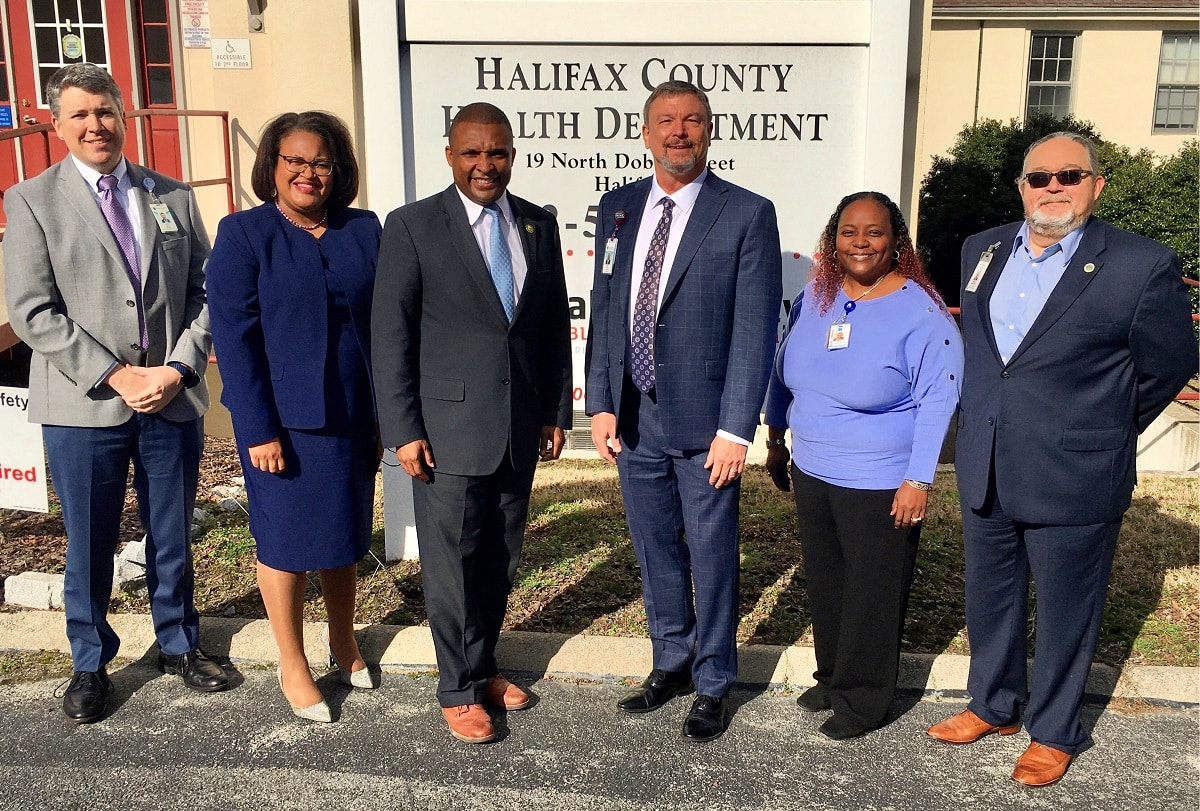
“ECU Health is grateful for the opportunity to meet with Congressman Davis and other community leaders to discuss Medicaid expansion and other important health care needs for Halifax County and the region we so proudly serve,” said Briley. “Medicaid expansion is a crucial initiative that would provide numerous benefits for the state, and especially here in rural eastern North Carolina, where we see high rates of chronic diseases and high rates of uninsured patients. Simply put, Medicaid expansion would make an important difference in the lives of so many, and we are committed to advocating for this important measure.”
Following the roundtable, Briley and Harrell welcomed Congressman Davis to ECU Health North Hospital for a tour of the hospital, including the oncology unit and women and children’s unit. During the tour, the leaders discussed how Medicaid expansion and the Healthcare Access and Stabilization Program would help provide much-needed relief for rural hospitals across the state, ensuring that rural North Carolinians have access to high-quality health care.
“Rural hospitals like ECU Health North play a critical role in the communities they serve,” said Harrell. “Our hospital is not only a hub for high-quality care, but it is also the largest employer in the county. Medicaid expansion should be a top priority for the state, and we appreciate Congressman Davis’s efforts to advocate for the health and well-being of eastern North Carolina.”
Resources
Leaders from across eastern North Carolina came together for the Vision 2023 event hosted by NC East Alliance at the East Carolina Heart Institute on the Brody School of Medicine campus on Jan. 13 to collaborate on workforce development solutions for the region.
Titled “The Power of Possibility: Envisioning the Future of Rural Regional STEM Education,” the event focused on education and job training for the next generation of regional leaders. This served as the first planning meeting for the STEM East Network which aims to improve education, professional learning, workforce development and economic development in the East.
Dr. Michael Waldrum, chief executive officer at ECU Health and dean of the Brody School of Medicine at East Carolina University, is an NC East Alliance Executive Board member and said he believes the health system’s partnership with NC East Alliance is crucial to advancing the mission of ECU Health and the Brody School of Medicine.
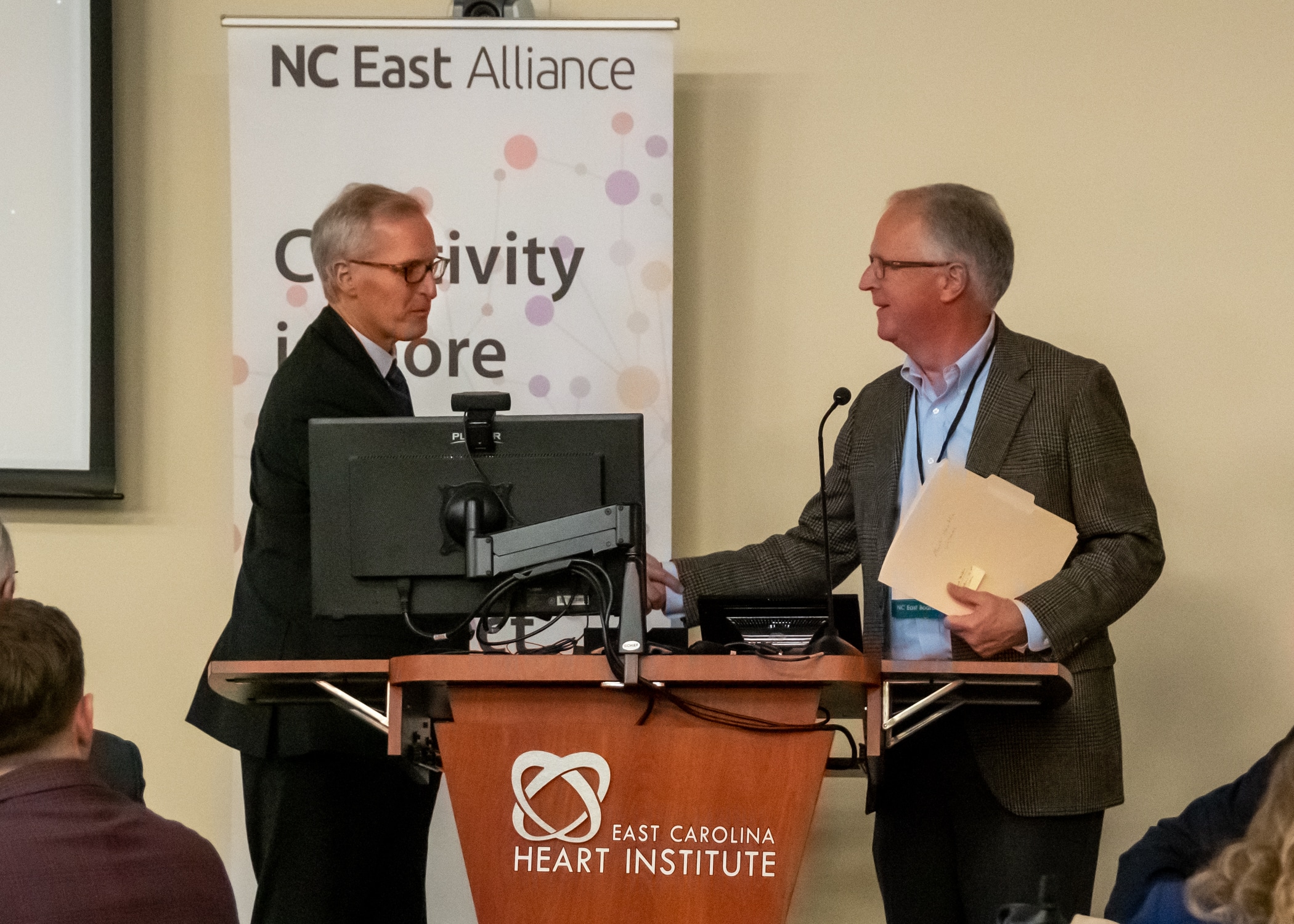
“I’ve been on economic development company boards for over 25 years, and I always say if you really want to improve the health and well-being of a community, you have to drive economic development and if you want to drive economic development, you have to educate people,” Dr. Waldrum said. “It’s really a global perspective – regional transformation and promoting communities involves creating economic opportunities, educating future generations and providing great health care services.”
The event had representation from 29 school systems and 14 community colleges from across eastern North Carolina and the morning session centered on creating an “Industry in School” Alliance that brings together school districts, community colleges and industry in a collaboration designed to bolster the region’s workforce.
Mark Hamblin, chairman of the NC East Alliance, said this new initiative is an important next step for the organization and the region as a whole.
 “A couple years ago we were wondering what was next for this organization and when we came together to develop this initiative, it made so much sense because a regional approach is so important to all of us,” Hamblin said.
“A couple years ago we were wondering what was next for this organization and when we came together to develop this initiative, it made so much sense because a regional approach is so important to all of us,” Hamblin said.
The STEM East Network steering committee will develop regional solutions to help educators become transformative stakeholders in the regional economy. This will include training educators, from elementary school through college, to better understand the industry and workforce needs of the region. As a result, students will have an increased awareness of jobs available in the region.
A key vision for the program is to keep high school graduates in the region for work and further education while the ultimate goal is to encourage eastern North Carolina’s homegrown workforce to stay and serve in communities across the region.
Dr. Waldrum said for rural health care specifically, this initiative is much needed to develop a strong workforce of future regional leaders.
“In health care we need a strong workforce,” Dr. Waldrum said. “Before the pandemic, workforce was a major issue with massive shortages on technicians, nurses and physicians primarily in rural communities. So we focused on how we could recruit and retain our workforce and provide access to care for a vibrant, rural community. Having a group like this come together and help us in that sector with STEM education and economic development is something that I really want to thank everyone here for making happen.”
Forward thinking and grassroots efforts are helping shape a better future for eastern North Carolina and working together is the best way to impact the region far and wide. ECU Health is excited to partner with industry leaders and elected officials, joining forces on regional initiatives like the STEM East Network to promote positive change in the communities we serve.
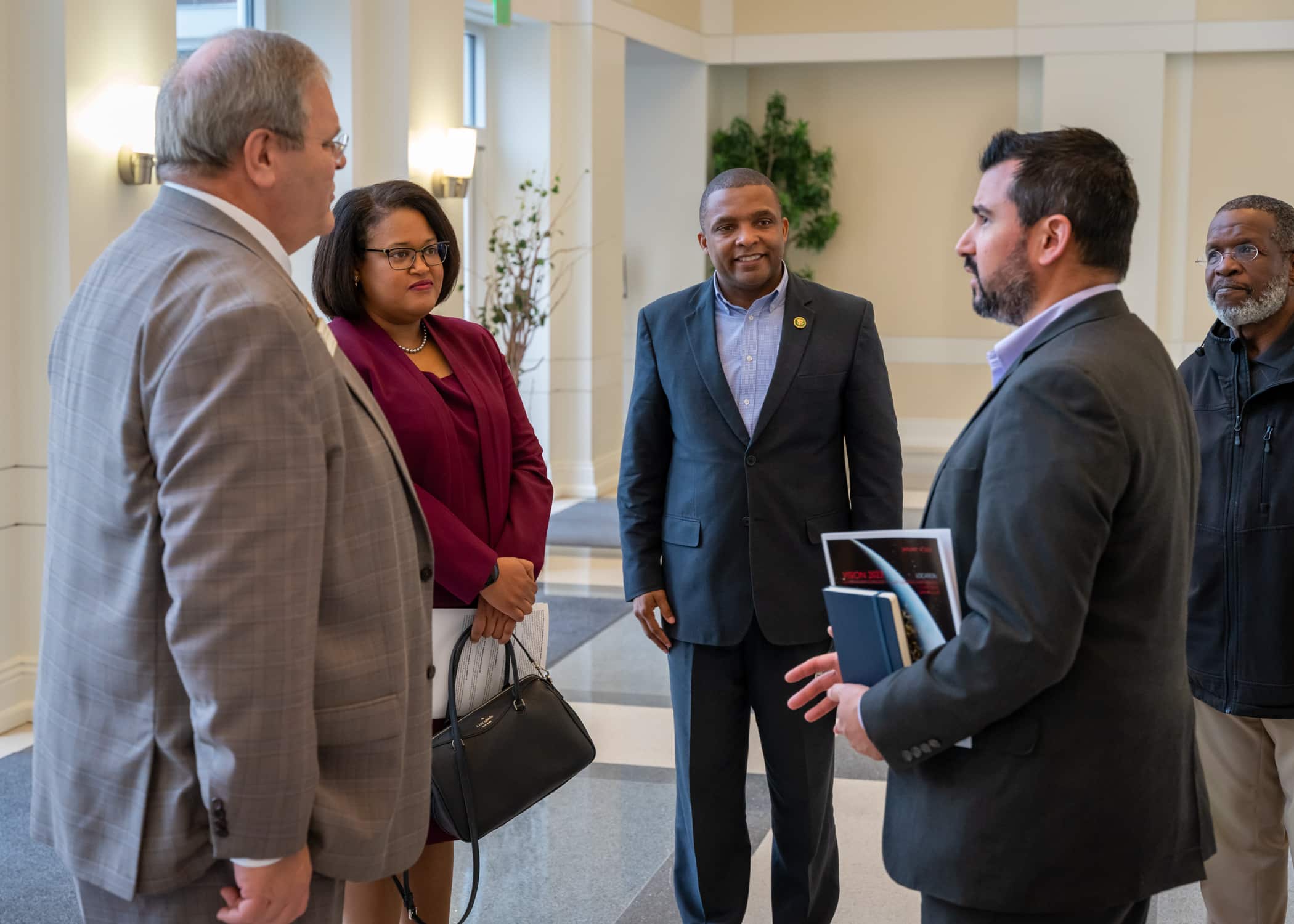


“It was very nerve wracking coming here,” said Denique Barnett, a pediatric rehab nurse at the James and Connie Maynard Children’s Hospital and international nurse at ECU Health. “I’m an only child, so leaving my family in Jamaica was very hard.”
For Barnett, pursuing her passion has been a journey of more than a 1,000 miles.
“The welcome that I received was a good one,” Barnett said.
The warm reception Denique received is one ECU Health offers nurses from around the world as part of the International Nurses Program.
“My passion is pediatrics, but specifically neonatal nursing,” Barnett said. “Back home there is no degree program for neonatology. So I decided that, you know, to further my studies and to self-actualize, I would need to come to the United States.”
Not only does the program foster additional growth and training for participants, it also fills an important recruiting need for the health system.
“We bring international nurses from all over the globe to come to our organization to spend about two years in a clinical environment,” said Charlene Wilson, chief people officer of ECU Health.
Launched in November 2019, 175 nurses from 21 countries have since spent time at ECU Health.
“Even though these are nurses that are seasoned nurses, they have to go through our NCLEX,” Wilson said. “They then go through the immigration process. They then begin to understand the culture of the various hospitals that have openings for international nurses. One of the things that is very different about their practice here versus their practice in their home countries is the technology.”
“At first, you know, getting used to just how things are done here using technology for me, that was a bit of a challenge,” Barnett said.
“I’m always told by the clinicians, including the doctors, that one of the things that is fascinating about what they bring is their analytical skills, because they don’t have the technology that we have here in the United States,” Wilson said.
It’s a unique perspective put to work for a common goal, improving the health and well-being of the region these nurses now call home.
“As an international nurse, making the leap is the best decision that you will make. There is a lot of opportunities for growth,” Barnett said. “There are a lot of benefits to being here at ECU Health, you know, just make the leap, come, you won’t be disappointed.”
Leaders of Pitt County’s Health Sciences Academy are working hard to give students the real-life skills needed to succeed in the work world—thus fueling the talent pipeline for our state’s employers.
While labor shortages have been prevalent across all industry sectors in recent years, it has been particularly acute in the health care industry and even more so in our state’s more rural communities. However, for Pitt County, this program has brought a tangible solution for training the next generation of health care talent in the Greenville area.
The Health Sciences Academy is a curriculum program, which was created to expose and prepare Pitt County high schoolers who wish to pursue a health care-related career after graduation.

During high school, students participating in the program complete a minimum of six courses that prepare them for various health careers. As part of their program experience, students can participate in job shadowing, mentoring, internships, medical research opportunities, career exploration, and volunteering at ECU Health. In addition to ECU Health, the school system works in tandem with East Carolina University Division of Health Sciences, Brody School of Medicine, the ECU Dental School of Medicine, Pitt Community College, Eastern Area Health Education Center, and the Greenville-Pitt County Chamber of Commerce.
“When people think of health care, they think of doctors and nurses,” said Reed Potts, Health Sciences Academy Coordinator. “Doctors and nurses only make up 30% of the health care workforce, so there are many more jobs out there that the kids do not know about.”
The program, which began in 2000, currently has approximately 1,000 student enrollees, and works with high school students exploring all pathways including two- and four-year colleges, trade school, the military, and others. Potts expressed pride that 30 members of the program’s current cohort will be first-generation college students.
“Seeing a career firsthand — you’ll know whether or not it’s for you,” said Lisa Lassiter, director of workforce development at ECU Health. “We had a student who was set on being a labor and delivery nurse, but after a firsthand experience through Health Sciences Academy, she adamantly decided it was not for her anymore. That’s valuable too, because if she hadn’t had that opportunity, she never would have known until her junior year of college during clinicals.”
Potts said that standalone career nights are extremely beneficial to recruiting future students into the program because they can touch, see, and feel medical equipment and talk to staff about potential careers firsthand. They are also now starting recruitment efforts even earlier among middle schoolers.
To participate in the Health Sciences Academy, students must maintain a 3.0 GPA, have a clean disciplinary record and complete 25 hours of volunteer hours per year. There are also two dedicated counselors that work directly with Health Sciences Academy students and travel to all of Pitt County high schools.
In this program, students learn many soft or durable skills, including leadership, critical thinking, accountability, and communication, and they also get other important training such as etiquette lessons, resume building, and ACT and SAT workshops.
Potts stated that there has been a major return on investment as this program expands the talent pipeline in the Greenville area. “Roughly 50% of the students who go through the Health Sciences Academy stay in the area and go to East Carolina University,” he said. “And we anticipate seeing that number go up even more.”
He also attested that every single student who goes through the program goes to a two- to four-year college, trade school or the military.
When asked what recommendations they would make to other counties looking to implement similar programs, both Potts and Lassiter discussed the importance of constant two-way dialogue between the health system and school system, to ensure the needs of both parties are being met.
“Having direct communication with the school system has been extremely beneficial because we can discuss what’s going great and how to mitigate certain challenges,” said Lassiter. “As a result, we have this very well-trained future pipeline.”
She also stated that many people may be turned off by the cost of a similar program but suggested that other schools and health systems can start small by using time as a resource or having exposure activities that do not cost money.
Read more on NCChamber.com.

